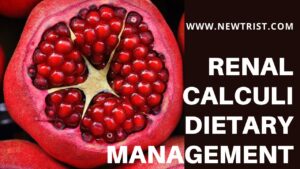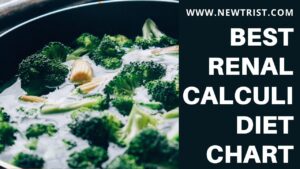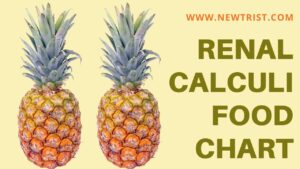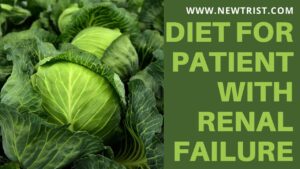Renal calculi diet chart includes cabbage, carrot, cauliflower, celery, cherries, corn, cranberries, cucumber, parsley, peach, pear, pepper, pineapple, and plum.
|
Morning drink |
Coconut water (200ml) |
|
Breakfast |
Quinoa poha (1 cup) with 2 egg whites |
|
Midmeal |
Amla juice with honey |
|
Salad |
Green Apple and Grapefruit salad |
|
Lunch |
Vegetable pulav with Grilled Chicken Breasts |
|
Soup |
Cream of Mushroom soup |
|
Evening snack |
Mixed sprouts |
|
Dinner |
Multigrain roti (2) with Mushroom and Green peas curry. |
Best Nutritionist in Bangalore
Consult 19-year-experienced Chief Nutritionist Vasanthi, in person at HSR, Koramangala, Bellandur, Haralur, Electronic city, or online across India.

Table of Contents
Renal Calculi
Renal calculi cause extreme pain, and the majority of patients arrive at the emergency room in anguish. A single incident does not result in kidney failure, but repeated renal calculi can harm the tubular epithelial cells, which can cause the renal parenchyma to lose its functional capacity.
Hematuria (blood in the urine) and discomfort in the flank, groin, or belly are frequently brought on by renal calculi. They afflict one in eleven persons at some point in their lives, with males being impacted more frequently than women (2 to 1).
Reduced urine volume or increased excretion of substances that might form stones, such as calcium, oxalate, uric acid, cystine, xanthine, and phosphate, are linked to the development of the stones. Low urine citrate levels or high urinary acidity can also result in calculi.
Symptoms Of Renal Calculi
Symptoms are typically not present until a kidney stone moves around or enters one of the ureters. The tubes that link the kidneys and bladder are known as ureters.
A kidney stone stuck in the ureters can restrict the urine’s flow, inflame the kidney, and cause the ureter to spasm, all of which can be excruciatingly painful. You can then experience the following signs:
- Severe, stabbing pain below the ribcage on the side and back
- Radiating discomfort in the groin and lower abdomen
- Pain that is intermittent and varies in severity
- When urinating, there may be pain or burning.
Other warning signs and symptoms could be:
- Red, pink, or brown urine
- Cloudy or stench-filled pee
- A constant want to urinate, urinating more frequently than usual, or urinating infrequently
- Nausea and diarrhea
- If there are an infection, fever, and chills
As the kidney stone passes through your urinary path, the pain it causes may alter, such as moving to a different spot or becoming more intense.

Renal Calculi Diet
|
Morning |
Orange juice |
|
Breakfast |
Uthappam + methi chutney |
|
Soup |
Roasted red pepper soup |
|
Lunch |
Rice + roti + snake gourd sabji + Rasam |
|
Salad |
Fruit salad (melon, apple, berries, citrus) |
|
Evening |
Green tea |
|
Dinner |
Jowar roti + raw banana curry + cucumber salad |
Foods To Avoid In Renal Calculi
Salty foods – high salt levels are associated with an increased risk of kidney stones and a greater amount of calcium being excreted in the urine. You should avoid salty foods as they can raise your sodium levels, which raises the likelihood of stones developing.
Fast food, processed, prepared, and canned meals all contain a lot of salt. Before eating prepared foods, always read the food label for sodium levels.
Vitamin c: if consumed in excess, as with a supplement, vitamin c can be transformed into oxalate in the body. Avoid using vitamin c supplements unless a doctor has prescribed them, and try to get all of the vitamin c you need each day from natural sources.
Calcium supplements: consuming calcium-rich foods does not increase urine calcium levels. However, consuming excessive amounts of calcium supplements gives your body far more calcium than it requires.
This causes more calcium to be excreted from the body through the urine, which may increase the likelihood that a stone may form. Ask your doctor what dietary alternatives there are to calcium supplements if you need to keep your calcium levels stable.
Certain fruits – due to their high oxalate content, fruits including rhubarb and dates may make kidney stones worse. Instead, make an effort to consume fruits like cherries, apples, and bananas.
Some vegetables – vegetables with a high oxalate content include spinach, potatoes, beets, and carrots. Since these are nutritious foods, you shouldn’t completely shun them. Instead, you can counteract your oxalate levels by eating foods high in calcium at the same meal.
Caffeine – caffeine can make you urinate more frequently, which could cause you to get dehydrated. Ask your doctor if you may still drink coffee if you have kidney stones because low water levels in the body increase the risk of kidney stones.
Animal proteins – consuming too much protein from animal sources can cause your body to accumulate uric acid. Uric acid can also result in kidney stones in addition to calcium oxalate.
You may increase your chances of developing uric acid kidney stones if you only consume non-vegetarian foods as protein sources. Try to stay away from animal-based proteins and substitute vegetarian ones.

Renal Calculi Dietary Management
|
Morning Drink |
Cucumber detox water |
|
Breakfast |
Oatmeal with apples and blueberries |
|
Soup |
Minestrone soup |
|
Salad |
Crunchy Couscous salad |
|
Lunch |
1 cup rice + 2 roti + ½ cup bhindi curry + ½ cup capsicum sabzi |
|
Evening Snack |
Pear and pomegranate smoothie |
|
Dinner |
Moong dal cheela + 1 cup of peas paneer curry |

Best Fruits For Kidney Stones
Apples:
- 20 milligrams of phosphorus and 195 milligrams of potassium are both present in 1 medium apple.
- Could alleviate constipation and decrease cholesterol and blood sugar levels.
- The high fiber content and anti-inflammatory qualities aid to enhance kidney function.
Grapes:
- 288 milligrams of potassium and 30 milligrams of phosphorus are both found in 1 cup of grapes.
- An excellent source of vitamins c and k. (low levels of these vitamins are linked to kidney disease).
- Contains minor levels of minerals like copper, manganese, and magnesium and is high in fiber.
- Pineapples
- Choosing low-potassium foods can help decrease blood pressure, a typical side effect of severe kidney illness.
- Contains bromelain, a digestive enzyme that aids in the body’s dissolution of kidney stones.
- High in fiber and good for the heart (heart complications are common in people undergoing dialysis).
- Excellent source of vitamin c, which supports the immune system.
Citrus fruits:
- The healthier your kidneys, the more vitamin c you consume. Vitamin c is abundant in citrus fruits like oranges, lemons, and others.
- Lemon juice diluted with water should be consumed every day to help reduce kidney stone risk.
Strawberries:
- Include ellagitannins and anthocyanins, two forms of phenols that enhance kidney function.
- Antioxidant-rich foods aid in preventing oxidative damage to the body.
- Excellent source of fiber, manganese, and vitamin c.
- Have anti-inflammatory and anti-cancer qualities that support general health.
Cranberries:
- Anti-inflammatory and antibacterial characteristics are in abundance, which is advantageous for patients with renal problems.
- Blueberries 114 grams of potassium and 18 milligrams of phosphorus are both found in 1 cup of blueberries.
- Anthocyanidins, a class of phytonutrients rich in antioxidants and which lower inflammation and advance renal and kidney health
- Good source of manganese and vitamin c, which are beneficial for skin and bones and help slow the aging process.
Raspberries:
- High in ellagic acid, a type of phytonutrient that helps the body fight off free radicals and stop cell damage.
- Include flavonoids, which can slow the growth of cancer cells and are beneficial for improving kidney function.
- Excellent source of fiber, folate, vitamins b and c, and manganese.

Best Renal Calculi Diet Chart
|
Morning Drink |
Apple cider vinegar drink |
|
Breakfast |
Methi Paratha (2), green chutney, and 1 glass of skimmed milk |
|
Soup |
Broccoli Soup |
|
Salad |
Yogurt with pomegranate and apple |
|
Lunch |
1 cup rice + ½ cup Lauki-methi sabzi + ½ cup green beans curry + 1 glass buttermilk |
|
Evening Snack |
Musk melon (1 cup) |
|
Dinner |
3 Jowar roti + 1 cup Colocasia curry + ½ cup cucumber salad |

Low Potassium Vegetables For Kidney Patients
- Alfalfa sprouts
- Asparagus
- Beans
- Broccoli
- Cabbage
- Carrots
- Cauliflower
- Celery
- Corn
- Cucumber
- Eggplant
- Kale
- Lettuce
- Mushrooms
- Onions
- Parsley
- Peas
- Peppers
- Radish
- Rhubarb
- Water chestnuts
- Yellow squash
- Zucchini squash

Low Potassium Fruits For Kidney Patients
- Apple
- Apricots
- Blackberries
- Blueberries
- Cherries
- Cranberries
- Grapes
- Grapefruit
- Mandarin oranges
- Peaches
- Pears
- Pineapple
- Plums
- Raspberries
- Strawberries
- Tangerine
- Watermelon

Low Potassium Foods For Kidney Patients
- Rice
- Pasta
- Noodles
- Bread and bread products (not whole grains)
- Pies without chocolate or high-potassium fruit
- Cookies without nuts or chocolate
- Coffee: limit to 8 ounces
- Tea: limit to 16 ounces

Renal Calculi Food Chart
|
Morning Drink |
Pineapple cinnamon tea |
|
Breakfast |
Bajra upma with vegetables, skimmed milk (1 cup) |
|
Soup |
Banana stem barley soup |
|
Salad |
Mushroom and Lettuce salad |
|
Lunch |
1 cup rice + ½ cup kidney beans curry + ½ cup rasam + carrot salad |
|
Evening Snack |
1 guava (medium-sized) |
|
Dinner | Dahlia upma with vegetables + 1 glass of skimmed milk |

Lifestyle Changes For Kidney Health
Fit and active:
Exercise regularly benefits more than simply your waistline. It may reduce the chance of developing chronic renal disease. Additionally, it can lower blood pressure and improve heart health, all of which are crucial for avoiding kidney injury.
Running marathons is not necessary to get the benefits of exercise. You can improve your health by walking, running, cycling, or even dancing. Find an enjoyable pastime that keeps you occupied. It will be simpler to follow through and achieve outstanding outcomes.
Blood sugar:
Kidney damage can occur in people with diabetes or another illness that raises blood sugar levels. Your kidneys must work harder to filter your blood when the glucose (sugar) in your blood cannot be used by your body’s cells. This can cause damage that is life-threatening over many years of effort.
However, you can lessen the chance of harm if you can manage your blood sugar. Additionally, if the damage is detected early, your doctor can take action to lessen or stop further harm.
Blood pressure:
Kidney injury from high blood pressure is possible. The effects on your body can be severe if high blood pressure coexists with conditions like diabetes, heart disease, or high cholesterol.
120/80 is a normal blood pressure value. Between 139/89 is prehypertension. At this time, dietary and lifestyle adjustments may help lower your blood pressure.
You may have high blood pressure if your readings are frequently greater than 140/90. Consult your doctor about changing your lifestyle, monitoring your blood pressure frequently, and maybe taking medication.
Weight management:
Obese or overweight people are more likely to have a variety of illnesses that can harm their kidneys. These include kidney illness, diabetes, and heart problems.
Kidney disease may be prevented with a balanced diet low in processed meats, salt, and other items that harm the kidneys. Concentrate on consuming fresh foods that are naturally low in salts, such as whole grains, seafood, blueberries, cauliflower, and more.
Drink a lot of water:
The cliched recommendation to drink eight glasses of water a day is not magical, but it is an excellent aim since it motivates you to stay hydrated. Drinking water consistently and regularly is good for your kidneys.
Your kidneys may remove toxins and salt with the aid of water. It also lessens your chance of developing chronic renal disease.
Aim for 1.5 to 2 liters or more each day. Your health and way of living play a big role in how much water you require. When planning your daily water intake, it’s crucial to take into account variables like the environment, exercise, gender, general health, and if you’re pregnant or nursing.
Over-the-counter medication:
Regularly taking over-the-counter (otc) pain relievers for arthritis, headaches, or chronic pain could harm your kidneys.
People who occasionally take the medication without kidney problems are probably safe. However, if you regularly use these medications, your kidney health may be in jeopardy. If you’re dealing with pain, talk to your doctor about kidney-safe medications.
Check kidney function:
Regular kidney function testing is an excellent idea if you’re at a high risk of kidney injury or renal disease. Regular screening may be advantageous for the following people:
- People who are older than 60
- Those who had low birth weights as babies
- Those who either have or have a family history of cardiovascular disease
- Those who have high blood pressure or whose family has a history of it
- Persons with obesity
- Those who suspect they may have damaged kidneys
A routine kidney function test is a wonderful approach to monitoring your kidney’s health and looking for any changes that could have occurred. Taking action early on can assist to reduce or stop further damage.

Diet For Patient With Renal Failure
Kidneys are vital organs of our body. Kidneys help in regulating the pH and blood pressure of the body.
Kidneys play an important role in eliminating the waste, excess water, and toxins produced from food. In case the kidneys are infected, the person must rely on dialysis for the purification process. When a patient is on dialysis, they must be keen on their diet.
Kidney stones, chronic renal disease, and urinary tract infections are some of the common diseases.
Loss of appetite, decrease in urine output, nausea, vomiting, and accumulation of fluids in the body are some of the symptoms of kidney diseases.
Uncontrolled diabetes, hypertension, cardiac problems, obesity, and hereditary factors may be the underlying cause of kidney diseases.
It is necessary to keep the body hydrated. Drinking a lot of water and fluids prevents the body from dehydration and the kidney flushes out the toxins through the urine.
Ginger helps in the purification of blood, so it is beneficial to include ginger in the daily routine.
Intake of fruits and vegetables such as banana stem, ash gourd, bottle gourd, and cucumbers helps in increasing the urine output and thereby pushing put all the unwanted substances from the body.
Best Fruits
- Apples
- Berries
- Watermelon
- Grapes
- Pineapple
Best Vegetables
- Cabbage
- Cauliflower
- Broccoli
- Green leafy vegetables
- Olive oil
Dairy products should be avoided as they’re rich in calcium, potassium, and phosphorous which may add an extra burden on the kidneys.
Foods low in protein, fat, sodium, potassium, and phosphorous are recommended for any kind of renal ailments.
Physical activity and eating a nutritious diet are beneficial to be parts of daily routine.